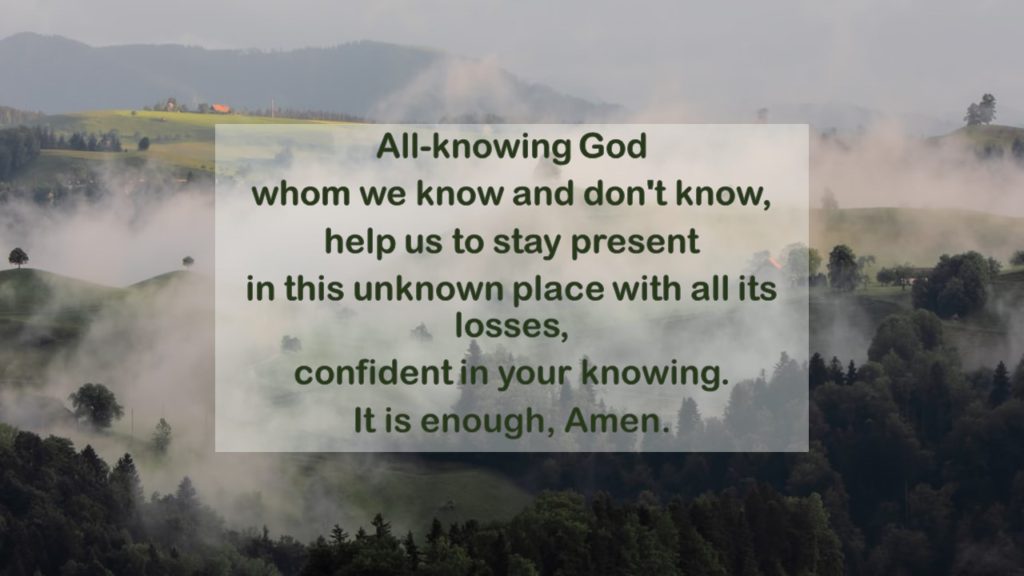

This week, ABC TV has televised Stargazing Live across three nights (the third episode will screen tonight). Thousands of ‘citizen scientists’, viewers on the first night, supplied ‘1 million new data points in a matter of hours, helping to classify 18,000 images from the Skymapper telescope at the Siding Spring observatory. Four of those participants identified a flash of light emitted from a galaxy 1.1 billion light years away.’
Astronomers examined the data from these four and were able to confirm on the next night’s show that they’d discovered a new supernova, an exploding star. It was ‘ridiculously exciting’, said one. Show presenter, Brian Cox, commented:
“1.1 billion light years means exactly that,
“When that star exploded, there were no living things beyond the ocean on the Earth.
“The light was almost here when humans evolved — and it was very nearly here when we began to do astronomy.
“Then we invented television, and eventually we made a television show … and ABC viewers saw it last night.
“If it’d happened a week later, we’d never have seen it.”
The italics above are mine; I confess that I didn’t see it, because I didn’t look – I haven’t watched the show over the last two nights, even though last night, I did seen a news item informing me about the possibility of the discovery of the supernova.
I sometimes check in with a web-page called Spirit Sightings, where the authors reflect on current affairs in the light of the Lectionary readings. When I read about the supernova this morning, I couldn’t help but reflect on Cox’s comments in the light of this week’s readings – the writers all talk about God and Spirit in the light of what they know and understand. Isaiah, moved by the death of a king, ‘saw the Lord’, David saw and heard God in the natural world around him, and Jesus saw the Spirit in the wind.
Spirit-Sightings occur in the stuff of our lives; we see God when look at our world, listen to the news, reflect on what’s happening. And sometimes, it’s ridiculously exciting.
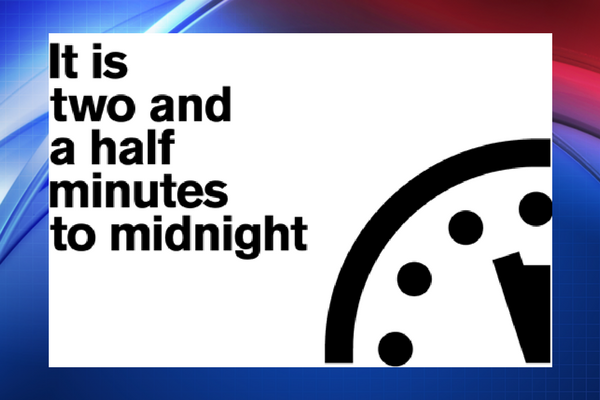
Three days ago, the Science and Security Board of the Bulletin of the Atomic Scientists moved the hands of the so-called doomsday clock from three to two and a half minutes to midnight, noting that ‘world leaders have failed to come to grips with humanity’s most pressing existential threats: nuclear weapons and climate change’.
They also cited Donald Trump’s disturbing comments about the use and proliferation of nuclear weapons as well as the emergence of strident nationalism worldwide.
The Board has issued a statement stressing how high the risk of global disaster is, but, for me, it’s not the risk but their concluding statement that is the most telling:
Wise public officials should act immediately, guiding humanity away from the brink.
If they do not, wise citizens must step forward and lead the way.
Wisdom, it seems, is currently in short supply. Yesterday, the scriptures listed in the Revised Common Lectionary included Micah 6:1-8 and 1 Corinithians 1:18-31. Both questioned their original readers and these questions continue to resound today:
From the apostle, Paul: Where is the one who is wise? Where is the scribe? Where is the debater of this age? Has not God made foolish the wisdom of the world?
From the prophet Micah: He has told you, O mortal, what is good; and what does the Lord require of you but to do justice, and to love kindness, and to walk humbly with your God?
Here are some questions of my own:
How might the oft-deemed foolish message of the gospel speak to the ‘high risk of global disaster’?
How has this gospel message been reduced to the question of whether one is pro-life or pro-choice, especially in the Christian discourse coming out of the USA?
If wisdom is not forthcoming from our public officials, what will the leadership of wise citizens look like?
Surely, it will begin with justice, kindness and humility.
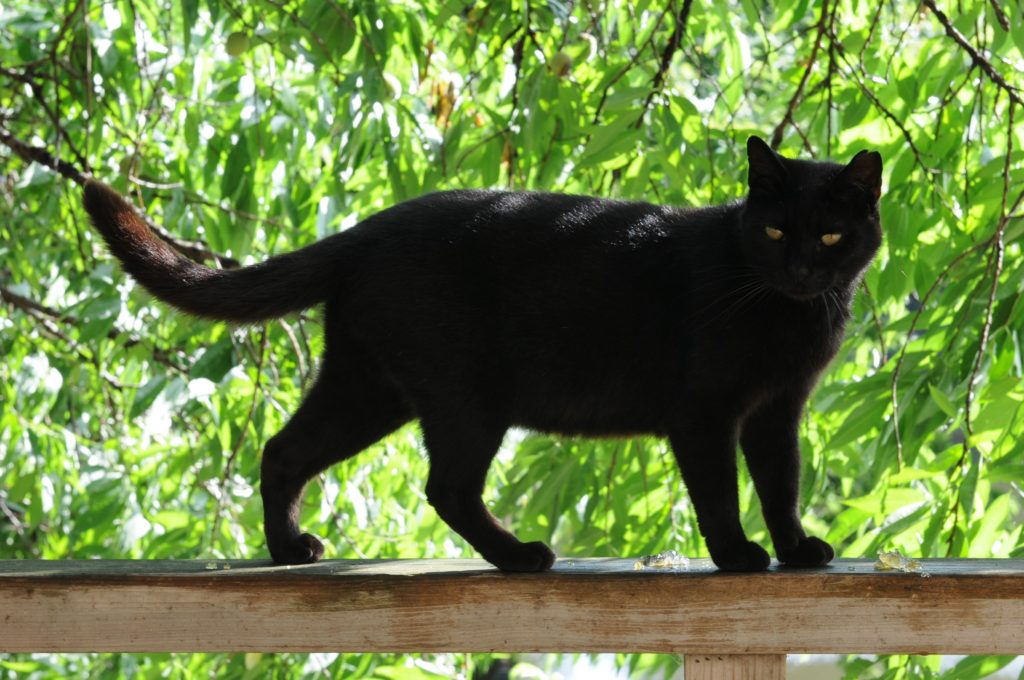
Ours is a dog-neighbourhood. We have two, our neighbour has one, as do the people behind him and the ones beside them.
So, I was surprised to see a black cat on our back fence last week. I was sipping coffee and reading a book when its movement caught my attention.
The image of it stalking the length of our fence before dropping into the yard behind us has stayed with me. I can’t help but admire its audacity.
Advent invites us to live in liminal space, in between a future promise and the current reality. Richard Rohr asserts that ‘we have to allow ourselves to be drawn into sacred space, into liminality (because) all transformation takes place here.’
The black cat on our fence was inhabiting liminal space. She knew the dangers, but did not let fear divert her. As she walked, she was paying attention, using her finely attuned senses to guide her. And she kept on-track, navigating her way along our fence towards whatever hope or promise lured her through dog-land.
It isn’t easy to live in liminal space and there is much to divert our intention to do so, especially in these weeks before Christmas, but Advent calls us to ‘allow ourselves to be drawn out of “business as usual” and remain patiently on the “threshold” (limen, in Latin) where we are betwixt and between the familiar and the completely unknown’ (Richard Rohr).
This is the space into which God comes.
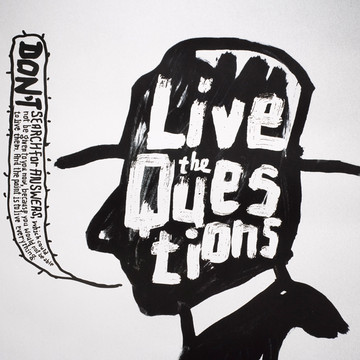
The German poet, Rainer Maria Rilke, in his Letters to a Young Poet, counselled:
‘Have patience with everything unresolved in your heart and try to love the questions themselves … Don’t search for the answers, which cannot be given to you now, because you would not be able to live them. And the point is to live everything. Live the questions now. Perhaps then, someday far in the future, you will gradually, without even noticing it, live your way into the answer.’
This piece of advice contains Advent themes: patience, waiting on answers by living the questions and hope for future resolution.
I don’t generally listen to talk-back radio, but yesterday, in only five minutes of a discussion about men and women sharing household labour, I heard a man live into his answer.
He rang in to say that he couldn’t understand why his wife didn’t always react well to his attempts to help her around the house. The guest speaker replied that perhaps he could re-frame his approach: rather than offering to help, he could ask his wife what he could do to share the work.
But, he replied, he was more than willing to help, why did she not understand that. The guest speaker tried again. By offering to help, he was implying that the work was hers and perhaps, she was failing in it. They lived together, the household was theirs, by offering to share the work he would be saying he understood that.
He started to speak again, but then paused, and in that moment of silence the listening audience heard the penny drop. His next words told us that he could see the distinction.
It was an Advent moment, for both of us. Clearly, his question troubled him, he had been living it and yesterday, on public radio, he lived into the answer. And the answer surprised him, not something he could do, but a different way to think about it. A way to re-frame the question.
As for me, I witnessed the coming of light into darkness. I heard the birth of understanding and insight, made all the more wondrous because I did hear it rather than see it.
Have patience … love the questions … live everything.
An Advent call.

Thunder in the desert!
Prepare for God’s arrival!
Make the road smooth and straight!
Advent is a time of preparation and way-clearing. It is a time to de-clutter. This is a tough call when everything around us calls us to come, to buy, to add more.
I suffer from piles: I let things and stuff pile up around me. The desk where I write is frequently covered with books and papers, lists and notes. My sewing cabinet is always open and littered with patterns and fabrics, pins and threads. The coffee table beside my chair in the living room is piled high with books and journals and things to which I need/should/must pay attention.
I know that this external clutter has a flow-on effect internally. Perhaps it’s no surprise that the higher the piles, the more likely I am to miss the exit off the freeway (which I did twice last week).
So, in preparation for Advent, I’ve cleared out my study. As I type this, the window in front of me is clean, I can see the desktop, only my sewing machine sits on the sewing cabinet, and a candle is burning. I still have a busy week ahead, but this external order calms me.
It helps to prepare the way.
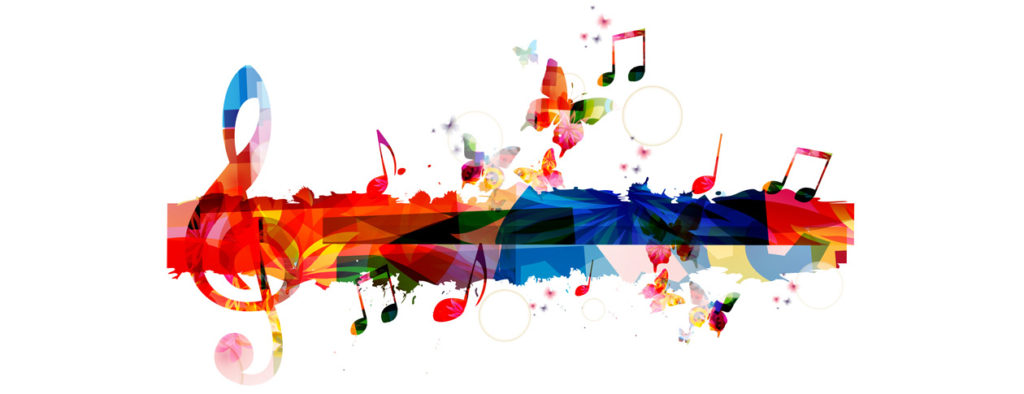
O sing to the Lord a new song
…
Make a joyful noise to the Lord, all the earth;
break forth into joyous song and sing praises.
From Psalm 98, this one of the Scriptures from the Revised Common Lectionary for this coming Sunday. Inspired by it, I looked to see what I might find on TedTalks under the topic ‘sing’. I’ve got to say the choices are not overwhelming, but these three claim my attention for different reasons:
Bobby McFerrin plays the audience as an instrument is a short clip in which he demonstrates that the Pentatonic Scale is hardwired into our brains. He makes the connection between notes and neurons in what is a fun watch.
Claron McFadden: singing the primal mystery goes further. She claims that music is a primal instinct and connects it to meditation. It makes me want to connect it to prayer. A beautiful and fascinating watch.
But, my favourite is Will Hewitt, Singing yourself alive. this seven minutes contains some profound ideas and quotable quotes including this one:
Time bows to authentic commitment and it stretches to accommodate it
Will Hewitt committed himself to sing for fifteen minutes every day for a year and did it. He discovered, among other things, that the world was already alive with singing and once he entered the practice, singing, making a noise, connected him to himself, the world around him and the world beyond. Watch it with others and allow some time to reflect on his findings.
And then, in the words of the psalmist, Sing and make a joyful noise.
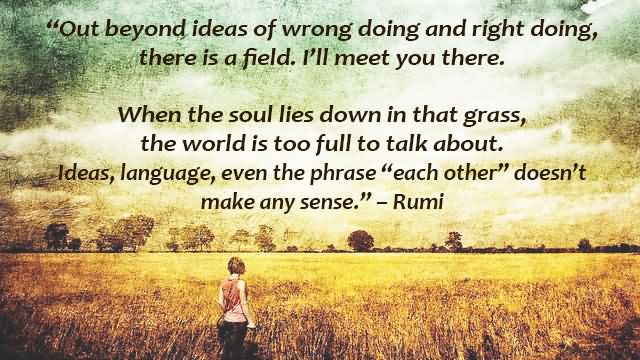
In a week in which conflict has been an underlying theme, I find myself longing for Rumi’s mystical field.
But …
Where is that field?
What does it cost to go there?
Will the Other(s) meet me there?
Imagine what the world would look like if even some of us make the journey …
Yesterday, I woke up to a discussion about the poll findings that one in two Australians want a ban on Muslim immigration. Later in the day I stumbled across this podcast of Dr Rachael Kohn interviewing Irish poet, Pádraig Ó Tuama, which offered me a way of thinking about it.
He read one of his poems, which contained the line
Who has taught us to fear?
A very good question.
Further into the interview, talking about differences in language, he said, ‘pain is never exhausted by language’ and invited his hearers to a stance of curiosity over issues of pain.
This word, ‘curiosity’, in Irish includes the idea of ‘wonder watch’. Wonder watch first puts me in mind of wonderful things – a magnificent sunrise/set, glorious colour, but Ó Tuama posed the question,
How can we observe pain and argument with wonder?
He called us to a spirituality that respects pain.
Thinking about this interview afterwards, I found myself composing my own Wonder Watch. What are the things that stir the snake-like coil of fear in me? What causes fear to stir, raise its head, prepare to strike?
What stirs the fear in you?
Let us seek to observe our fear with wonder and maintain a Wonder Watch in the face of it.
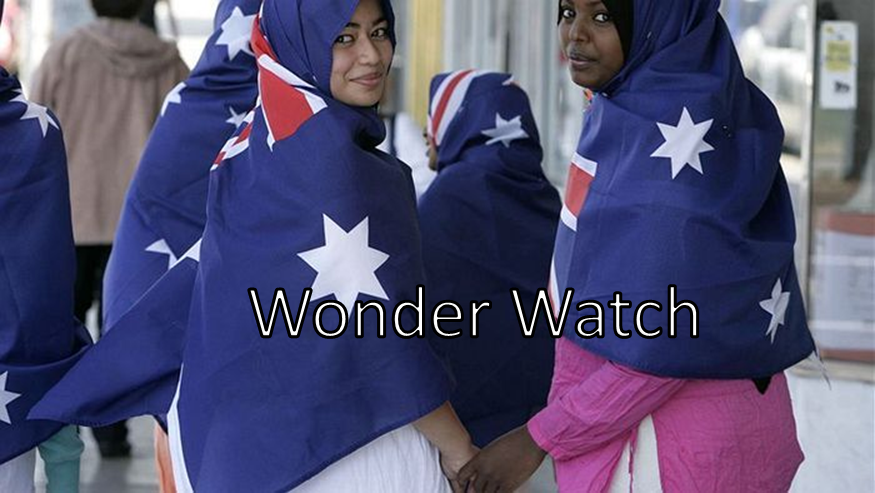
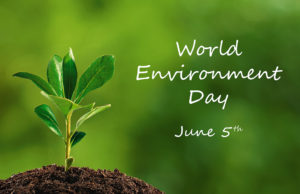 Today is World Environment Day. Established by the United Nations Environment Program and the World Meteorological Association in 1972, it’s celebrated annually on June 5th.
Today is World Environment Day. Established by the United Nations Environment Program and the World Meteorological Association in 1972, it’s celebrated annually on June 5th.
To mark the day falling on a Sunday this year, Uniting Justice Australia prepared a resource pack tied into the Lectionary readings for use in today’s services. Here’s an edited version of a story, written by Rev. Eseta Waqabaca-Meneilly, from these resources:
60-year-old Lionola in Tuvalu is packing her woven coconut basket with items she will take with her to the new place. She will have to learn to call this new place ‘home’. What will this new home be like, she wonders. She hasn’t even been to this other island, also in the South Pacific. All she knows is that it’s called Koro, a place that doesn’t have the rising seawater problems that her islands have.
She neatly folds in some clothes and items she will need. So many things she can’t take with her – flowers and food from her garden which are now saltwater-ridden and will not grow well anywhere; her beautiful pride of Tuvalu handcrafted mats, fans and shell necklaces that she had painstakingly learnt to weave and thread from her mother and grandmother as she was growing up. She may not be able to recreate these in her new `home’. The pandanus leaves will be wrong, the stain, the texture. All wrong. Lionola starts to cry into her handkerchief.
The plane will be here tomorrow to take her and some relatives to Koro. There is no hope. She suddenly brightens up and wipes away tears. There is hope! She reaches to the bottom of her basket and pulls out two books, a Bible and a hymn book, both written in the Tuvalu language. Her hope is in these books. It is called God.
One of the Lectionary readings today comes from the Hebrew scripture found in 1 Kings 17:8-24. Set against the backdrop of drought and famine, it tells the story of a widow who is about to prepare what she thinks will be the last meal she and her son will eat. Into this desperate place comes the prophet, Elijah, who asks her to share this last precious meal with him. A big ask! When our resources are depleted and we’re running on reserve, we are tempted to clutch what we have to ourselves and harden ours hearts towards others, to turn our compassion down to zero.
This is why the story from Tuvalu moves me – I think of myself as being concerned about climate change. I’ve attended protest events, waved a placard! I worry about what kind of world my grandchildren will inherit. But I’m not really under threat, living as I do in Melbourne; at least, not a threat that I can see. I’m not going to lose my home, my country. Unlike Lionola.
The sobering reality is that the threat is very real to people not that far away from me and I have barely given them a thought.
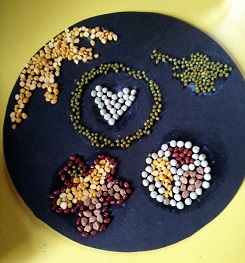
Mandala created by Abi, Tylden Uniting Church, World Environment Day, 2016
Rev Dr Ji Zhang is quoted in the Uniting Justice Australia resources:
Climate Change, if we look closely and honestly, is about suffering. It is a modern doctrine of suffering written in environmental language and supported by scientific evidence. This suffering has a myriad of appearances. What the climate crisis teaches us is something about ourselves. Climate change is not just an environmental crisis, but also a crisis of humanity. Its essence is brokenness …
Taking action on climate change is a way of making a public confession, but also an invocation for God’s life to transform us into hope.
I like this idea of action including confession and invocation in respect to climate change. Confession helps me stare into the abyss and come face to face with what ought not to be. Invocation or prayer, especially contemplative prayer, brings me back to hope: that the universe is teeming with the life-giving energy of an all-loving God, all is not lost. Thanks be to God!